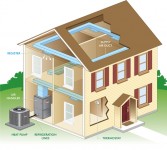

 Welcome Back Readers! Thanks for stopping by again, this week we will be learning about what Home Inspectors look at when inspecting Heat Pumps. Matt Steger, with WIN Home Inspection will be telling us some more after the jump, don’t forget that Matt is the man I call when my clients need to make sure they are purchasing a problem free home, you should call him too, 717-361-9467. See you on the other side!
Welcome Back Readers! Thanks for stopping by again, this week we will be learning about what Home Inspectors look at when inspecting Heat Pumps. Matt Steger, with WIN Home Inspection will be telling us some more after the jump, don’t forget that Matt is the man I call when my clients need to make sure they are purchasing a problem free home, you should call him too, 717-361-9467. See you on the other side!************************************************
In the prior week, we’ve discussed what a heat pump is, how it works, and what SEER means.
OK, so how does the home inspector inspect a heat pump?
Since 60~62 degs F is the rule of thumb cutoff for running a heat pump in cool or heat mode, the inspector will typically operate the system in either heat or cool mode, but not both. Within the standards of practice for both the National Association of Home Inspectors (NAHI) and the American Society of Home Inspectors (ASHI), the home inspector operates the unit using normal operating controls. This means ON/OFF at the thermostat. The inspector does not disassemble the unit to clean and service it, however, the filter should be accessed and most inspectors will view the evaporator coil by removing a readily accessible front cover or panel. The inspector does not inspect duct interiors, remove vent covers, or calculate HVAC efficiency.
The type of system should be noted and most inspectors will report the brand, the year of manufacture, and its approximate cooling rating (based upon the unit’s manufacture tag or model number) as well as inspecting the exterior of the accessible duct system, condition of the compressor unit. Two similar homes may have different cooling needs, based upon several key factors, such as finished square footage, type of windows and insulation, direction of the home, etc. The inspector, however, does not calculate the home’s cooling or heating needs. This can be done by a qualified HVAC professional.
Most inspectors will also take a temperature measurement to ensure the unit has a normal heating rise or cooling drop. For cooling systems, a typical temperature drop (called “deltaâ€) is 14~22 degs F between a supply vent and an intake vent when the outside temperature is 74 degs F and above, although when the outside temperature is in the 60~73 deg F range, the delta will probably only be 6~14 degs F.
If the measured temperature is outside of these ranges, the two most common culprits are an improper refrigerant charge or possibly a frozen evaporator coil, although other problems may exist. Each will normally require service by a qualified HVAC technician. If the system has not been professionally cleaned and serviced within the past 12 months (unless new), this should also be done. As with just about every other system in the home, preventive maintenance is crucial and if done regularly, will help minimize expensive repair bills down the road and help prolong the system’s serviceable life.
**********************************************************************
So there you have it, all you wanted to know about inspecting heat pumps! Still have more questions? Don’t be afraid to pick up the phone and call Matt Steger at 717-361-9467, he is available 7 days per week! Tune in next time for some Spring Home Maintenance Tips!
As always, I’d like you to be part of the conversation, so if you like what you read here please comment, forward The Lancaster Connection.com to your friends and subscribe!
If you have questions, need real estate advice or want to buy or sell a home, you can call or text me at 717-371-0557, email me at Jason@JasonsHomes.com or contact me at the office at 717-490-8999!
Your Friend in Real Estate,
Jason Burkholder
Weichert, Realtors – Engle & Hambright
Search for Lancaster County Homes for sale at www.JasonsHomes.com by clicking here!
Want to see what’s happening to home prices in your neighborhood? Go towww.RealEstateCrystalBall.com !